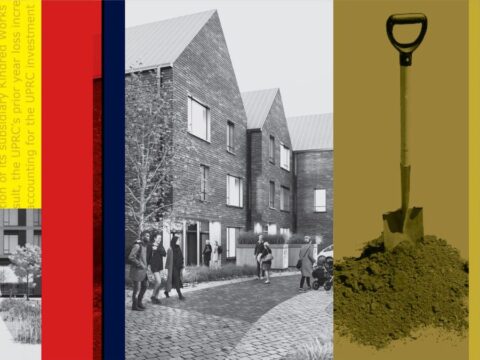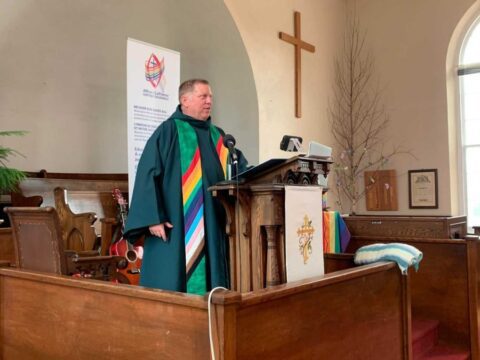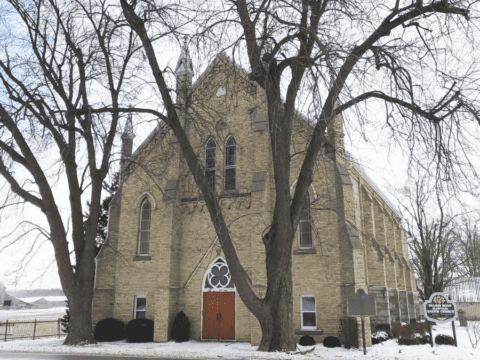Friday, May 14, 2004. Andrew Genge is playing rugby at Fletcher’s Field in Markham, Ont., when he is tackled hard by a big guy from the opposing team. He remembers getting up, running off the field and sitting on the grass, not yet aware that most of the bones in his face are broken; trying to give his emergency contact number while people say, “No, no, don’t talk.” He throws up constantly during the ambulance ride and for the rest of the day.
He remembers nothing else. Just after midnight, Genge has a stroke. A clot from his torn carotid artery has hit his brain.
You may unsubscribe from any of our newsletters at any time.
His right side is paralyzed, and he can’t walk, talk or even swallow.
He is 15 years old.
Upon news of the injury, his mother, Susan, a United Church minister, rushes to the hospital from a seminar at Toronto’s Emmanuel College. His father, Glen, leaves the annual meeting of Bay of Quinte Conference, where he has been playing in the Spirit.calm Praise Band. They see him through CAT scans, talk with the plastic surgeon and other specialists, get him settled and go home briefly to regroup. But Genge’s stroke calls them back in the middle of the night, and along with his older sisters Amy and Katie, they sit down again with the doctors. “The reality started to sink in that our son might not live,” says Susan. “We just wept as a family. Andrew is the youngest. We placed Andrew into God’s hands.” All they could do was “pray and hope and believe and trust and love. I’ve never been very good at trust,” she adds. “That was a big challenge.”
Two and a half years later, Genge looks back on that time with a kind of wry humour and the occasional hesitation in his speech. Now in his last year of high school and hoping to embark on a degree in kinesiology, he takes a break from homework to talk about what all this has meant.
One thing, you learn who your friends are. The day after his accident, while he lay speechless in critical care, about 40 of them arrived to be near him, “even though I wasn’t there,” he says.
In little groups they were allowed into his room, and (he was told later — he has no memory of the week after the accident) he managed the kind of crooked half smile typical of stroke patients.
A month later, he was moved to Bloorview MacMillan Rehabilitation Centre in Toronto, slowly graduating from a feeding tube to puréed food, and from bed to wheelchair to cane to brace. His friends came five-a-day every day for four months. Finally, on Thanksgiving weekend 2004, when he was driven triumphantly home in a friend’s father’s silver sports car, they were all there to greet him with balloons, celebratory cakes and a big “Welcome home Andrew!” sign covering the garage door.
They were, and are, patient. “A person who has had a stroke on the left side of the brain often can’t say something,” Genge says, and you just have to “wait for them to try and sound it out.”
If there’s anger in him, it’s around that fierce struggle to regain words. His speech therapists would tape-record him, and “to hear me speaking was overwhelming, how bad it sounded.
“It made me mad.” Even now, he says, speech sometimes deserts him.
“The other day, I was talking to my friends and I made no sense at all. It made sense in my head, but I just couldn’t say it.”
It’s one of the ways his life has changed. “Maybe I’m not as popular as before,” he says, “because I don’t speak as well, and I don’t come up with the same things as I used to.” There is not one shred of self-pity in his voice as he says this.
He holds up both hands. After months of exercises, it is still “really hard to get this hand acting like this hand…. I can’t throw a ball with any accuracy. ” Once named his football team’s most valuable player, he can never play football or rugby again. His father took him snowboarding that winter — wearing a helmet, and without telling his mother in advance — but when asked what his sport will be now, Genge grins and says, “Chess?” Probably he will play soccer, he says, although he hasn’t played since he was very young. “Maybe old habits will kick in.”
When asked about the player who tackled him, Genge is neutral, as if he had got in the way of a stray tornado. “It was an accident,” he says decidedly. At the same time, though, neither anger nor forgiveness have had an outlet. No coach or player from the other team has contacted him. Genge wonders if the player “knows he crushed my face. If he knows I had a stroke.” He’d like to talk to him. “I’d tell him, and I’d just wait for the reaction.”
Genge is both determined and mature for his years. He doesn’t doubt he will recover, he says, and — when pressed— offers advice for others who hit a similar metaphorical brick wall. “You have to stay positive and think all the time that you’re going to get back to 100 percent.”
It helps to have family like the four who sat in that hospital room on May 15, 2004, and placed him in God’s care and did their best to trust it. “I surrendered our son to God,” says Susan. “I said, `God, you know how much we love our son. If it is better for Andrew to go home to you in heaven, take him home. But if you want him to stay on Earth to fulfill your plan for him, help him live and recover.'”
Genge says that he did ask, “Why me?” but felt that “God must have a certain plan for me down the road, and I was just not seeing it.” So he just held on. All through those frustrating months of facial surgery and repetitive exercise, he “fell back on my family. If they are not there to catch me, God is always there. . . . God is my backup plan.”
And of course, there were all those friends flooding into the critical care unit and turning up day after day at Bloorview. “I’m surprised” — he grins again — “that many people showed up. God must have had something to do with it.”
Certainly Susan has no doubt. In the days and months after Genge’s injury, food magically appeared. Friends from Habitat for Humanity, for which the whole family has volunteered, weeded the garden. Several United Church congregations in Oshawa raised $18,000 at a benefit concert, in case, for instance, a van was required to get Genge around. Northminster United, where Susan was a minister at the time, put regular reports about Genge on its website, which were picked up and e-mailed from one person to another until prayers were being said for him by people he didn’t know all over the world.
An emergency room doctor who had cared for him that Friday night followed his case and got him into a new therapy program involving stimulation of his arm and hand muscles by electric current. A Roman Catholic hospital chaplain simply radiated “joy and hope and trust and faith” at a point when they were all stunned, says Susan, and “helped us believe that Andrew would pull through.” And that first weekend, a green shawl was passed from table to table at Bay of Quinte Conference, held and prayed over by every person there, and then draped over Andrew in the critical care unit. It still sits at the foot of his bed.
The seminar Susan had been attending at Emmanuel College that Friday was on African-American preaching. About the time that Andrew’s face was being crushed by the force of that tackle, she was learning the verbal responses typical of that preaching style. “The speaker would say, `God is good.’ And we would say, `All the time.’ And he would say, `All the time.’ And we would say, `God is good.'”
That became Susan’s mantra, while she learned in her heart what she had known before only in her head. “Our children are not our children. They are God’s children, entrusted to our care for a certain period of time.” She doesn’t know why, she says now, that “some children die and others live. I do not know why some children suffer with severe injuries or diseases, while others remain healthy and pain-free.” But she does know this: “God is love. And God is good.”
This story originally appeared in the January 2007 issue of The Observer with the title, “Andrew’s Story.”














